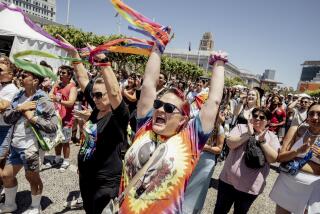A Gay Loss, and Maybe a Big Win : Could parade decision be lever to dislodge military ‘don’t ask, don’t tell’ rule?
- Share via
By ruling that organizers of the St. Patrick’s Day Parade in Boston could exclude a contingent of Irish Americans marching under a banner proclaiming themselves gay and lesbian, the Supreme Court has produced a major legal precedent that is significant in two very different ways.
First, the rare unanimous ruling affirmed historic First Amendment rights of free speech, however repugnant and intolerant the views of the parade organizers. It said the parade was a private event and that the Constitution did not compel the sponsors to accept expressions and views with which they disagreed.
Second, paradoxical as it may seem, it also handed the gay rights movement a potentially valuable legal precedent for the future.
The parade sponsors, the South Boston Allied War Veterans Council, canceled last year’s parade after a Massachusetts state court ruled that the parade through city streets was a public accommodation, subject to the same laws that prohibit hotels from discriminating on the basis of sexual orientation or race.
After the state’s high court upheld the ruling, the veterans council took its case against the Irish American Gay, Lesbian and Bisexual Group of Boston to the U.S. Supreme Court.
Justice David H. Souter’s narrowly drawn opinion was a masterpiece of judicial balance and restraint. “The very idea that a non-commercial speech restriction be used to produce thoughts and statements acceptable to some groups or, indeed, all people, grates on the First Amendment,” he wrote.
However, the case could have been used by court conservatives to isolate and stigmatize gay Americans even further. Instead, the Souter opinion argued that freedom of speech involved deciding not only what to say but what to leave unsaid. Would the organizers of this Saturday’s gay pride parade in West Hollywood want to be compelled by law to allow the Rev. Louis Sheldon’s Anaheim-based Family Values Coalition to run a float down Santa Monica Boulevard to spew intolerance and hate toward homosexuals?
The ruling does not require parade sponsors to discriminate. We hope that the Boston and New York St. Patrick’s Day parade organizers will recognize that large numbers of Irish Americans, including combat veterans and family members, are gay and deserve respect and acceptance, not cruel ostracism.
Whether or not that happens, the court ruling is welcome for its possible implications for challenges to the hollow “don’t ask, don’t tell” policy governing homosexuals in the armed forces.
By implying that identifying oneself as gay was the kind of expression protected by the Constitution in the public arena, Souter may have laid the legal groundwork for upsetting the misguided ban on homosexuals in the military.
More to Read
Sign up for Essential California
The most important California stories and recommendations in your inbox every morning.
You may occasionally receive promotional content from the Los Angeles Times.










